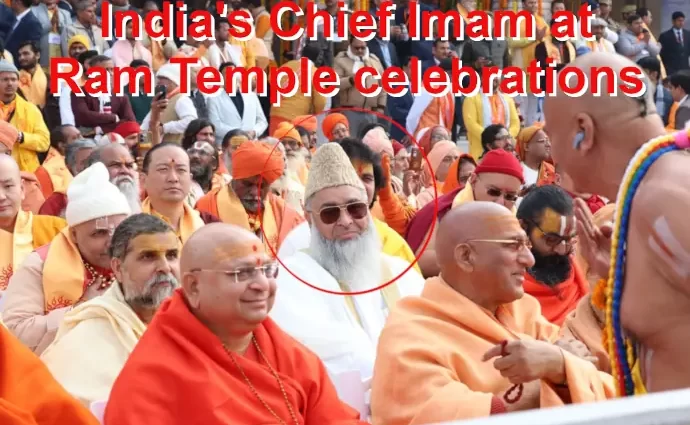When the Indian Prime Minister Narendra Modi completed the Pran Pratistha of Ram Lalla in Ayodhya’s Ram Mandir on January 22, history was being made for the world and posterities to nurture and cherish in the decades and centuries to come.
While a devout Hindu, Narendra Modi who had observed an 11-day ‘anushthan’ ritual starting on January 12, led the global celebrations by participating in the Pran Pratistha ceremony, a Muslim cleric, Dr Umer Ahmed Ilyasi, chief Imam of the Imam Association of India, chipped in to make his contribution to the history making effort by accepting the invite sent to him to attend by the Ramjanambhoomi Teerth Kshetra.
Imam Ilyasi thought it was the right thing to do, for the nation, humanity and for brotherhood of Hindus and Muslims.
But, according to Mufti Sabir Hussaini, Imam Ilyasi should not have accepted the invite and remained away. According to Hussaini, Imam Ilyasi is not acceptable in Islam any more.
Fatwa issued against Imam Ilyasi
I want to point out that this is not an Islamic country. This is India. There is unity in diversity in India. If these people have issues about my giving a message of love by attending the ceremony, I believe in the country. If they feel I have committed a mistake, they should perhaps go to Pakistan. I have not done any wrong. I do not believe in any ‘fatwa’. I stand firm on my views and will not change them for these people.
An atmosphere of hatred is being created against me. Abusive language is used against my family and me. A ‘fatwa’ has been issued on behalf of Mufti Sabir Hussaini against me. He has published my mobile number in his post and made it viral across the country. They want me to apologise and resign, or else be prepared for the consequences.
The only sad incident which has taken place is the issuing of fatwa against the chief Muslim leader, president of the Imam association of India, Dr Umer Ahmed Ilyas.
After Ram Janmabhoomi (temple) trust sent him an invite to attend, Dr Ilyasi says he thought for two long days, whether to accept and attend or not.
“I kept thinking what decision I should take, because it was the biggest decision of my life. But then I thought for communal amity, for the country, and in the national interest, I took this decision and I went to Ayodhya” (to attend).
The people of Ayodhya welcomed him. All sadhus and seers acknowledged him and expressed joy and the temple trust also welcomed him.
“My aim was to send ‘paigam-e-mohabbat’, which I delivered there”, the Imam added.
“We belong to different castes, our way of worshipping may be different, our rituals may be different, our religion may be different, our faith may be different, but our biggest religion is of being human and humanity,” Imam said responding to the Fatwa issued against him.
“Secondly, we live in India, so we are all Indians, and we all should together make India strong, and Indianness strong. The nation is above all. The moment I gave this message of love, it started coming up on social media and various channels. Since then, on my telephone, I started getting threats, abuse,” Imam Ilyasi said.
The fatwa also takes exception to ‘my comments on insaniyat as the biggest religion’ and that the nation is ‘above all’, he added.
The imam said he had done nothing wrong, so there was no question of him tendering an apology.
He said no one has the right to issue such a fatwa. “This is India of ‘sarva dharma sambhav’, of unity in diversity,” he said.
Similar Posts by The Author:
- This is why Peta Credlin should apologize to Australian Indians
- India and the United States Spearhead Global Disaster Resilience Efforts through CDRI
- A big win for Nurul Khan in his bid to unmask Victorian ‘Labor dirt sheet plotters’
- Australian Muslims call for transparency and accountability of Law Enforcement Action
- Problems of Arvind Kejriwal lie in the Charge-sheet against Manish Sisodia

